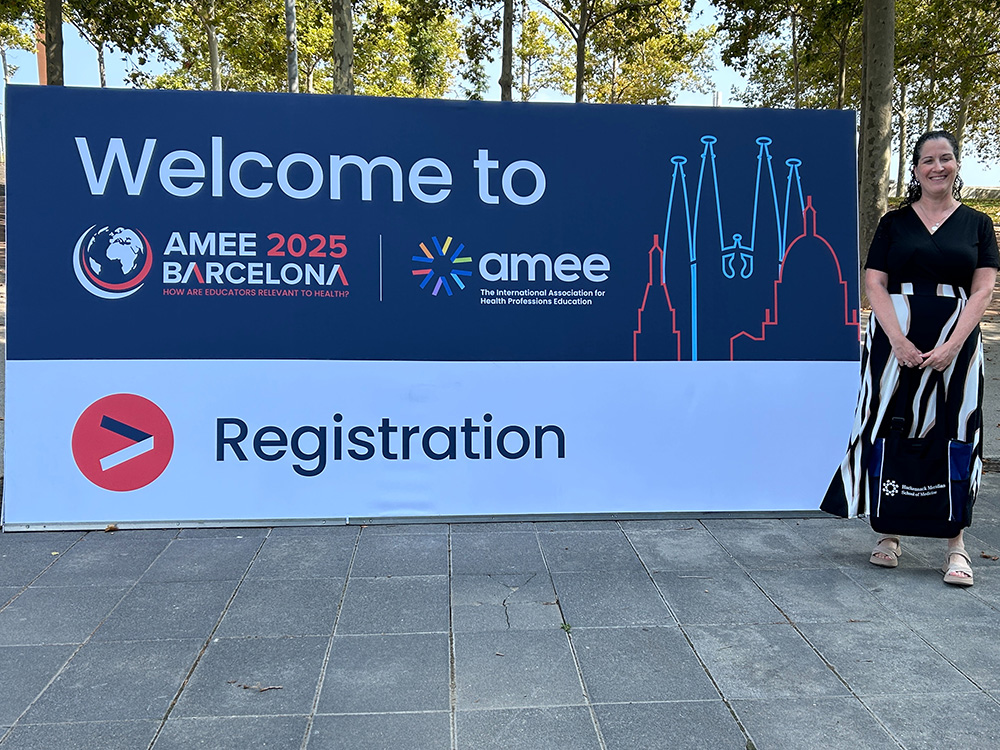Hackensack Meridian Vice Dean Presents Innovative Curriculum on Global Stage
October 20, 2025
HMSOM Vice Dean Dr. Miriam Hoffman details a uniquely tailored 3+1 curriculum, redefining medical education for changing healthcare needs, at the AMEE 2025 international conference.
In a collaborative and informative setting, a top educator became a global ambassador in showing what her medical school’s program brings to the table.
Miriam Hoffman, M.D., vice dean for academic affairs at the Hackensack Meridian School of Medicine (HMSOM), recently presented the school’s unique “3+1” curriculum to an international audience of medical educators at the AMEE 2025 conference in Barcelona, Spain.
The International Association for Health Professions Education (AMEE)---with members in 90 countries—promotes global excellence and collaboration in health professions education. The conference provided a fitting backdrop for Hoffman’s presentation, with its thematic question, “How Are Educators Relevant to Health?”
Though it was the first time anyone from HMSOM had attended the prestigious event, Hoffman and her team’s research-backed approach to the “3+1” model were selected as finalists for the Patil Teaching Innovation Award, which celebrates practical innovations in curriculum planning over the traditional medical school approach.
“I’ve stopped saying, ‘Traditional’ curriculum; I now say, ‘Old-fashioned,’” said Hoffman. “This ‘3+1’ model is a real contribution to getting some individualization into this behemoth that is medical school.”
Hoffman said the award finalist selection was self-evident as to strategic refinement within HMSOM’s curriculum compared to legacy med school curricula.
Using Time to Make Time
Hoffman’s presentation detailed a curriculum structure designed to be competency-based and less time-bound. The model—also outlined in a recent study in Medical Education Online—features a three-year core curriculum followed by an 18-month individualized phase.
The curriculum was developed to address different learning paces, student debt at graduation, meeting students’ personal goals, and other factors.
During the final phase, students create an Individualized Learning Plan driven by their performance on 18 Entrustable Professional Activities (EPAs) to meet their unique developmental needs and career goals. The individualized phase allows pursuits from intensive research to advanced degrees.
While the curriculum is often noted for allowing some students to graduate more quickly than other medical school curricula—with HMSOM mentioned in a recent U.S. News & World Report synopsis of three-year med school programs—Hoffman emphasized that its individualization is the more significant innovation.
“We need to be less driven by thinking, ‘You should do two years of this, and one month of this, and three months of that,’” said Hoffman. “You have to ask,”How can we morph the educational program to meet the goals and needs of the learners?’”
The model allows students who master competencies quickly to pursue advanced goals like an MBA or an intensive research project. According to Hoffman and her team’s research, it also provides a "safety net" for those who need more time to meet core requirements, all guided by "very robust advising and data systems" that make planning a "very iterative process."
Defining Future Physicians Through HMSOM Core Concepts
Hoffman noted, despite the diverse origins of the attendees, the challenges they face are often universal.
“One thing very striking to me was how everyone in MedEd is really struggling with very similar things,” said Hoffman about the conference’s breakdowns into small-group collaborative sessions. “Every session that I was in, there were aspects of HMSOM that I could bring to the discussion.”
This observation was none so evident as when Hoffman took part in a “Professional Identity Formation” workshop, aimed at understanding goals of the “final product” found in HMSOM’s graduating students as they hang their tasseled caps on certain pillars long-term when defining their core ideals in an ever-changing world.
Hoffman cited two core concepts that also came up in her discussions at multiple conference sessions: Information mastery and the Human Dimension (HD). Both serve as curricular staples through which HMSOM students develop professional identity and critical skills.
“The information is always going to change,” said Hoffman. “Information mastery is not simply about memorizing information, but about building critical thinking and cognitive skills around where to find and critique information at a granular level, while asking if I can trust a certain information resource at a high level.”
That critical thinking process ensures finding the best information possible—and scrutinizing said information in a setting of positive civil discourse—to directly provide optimal patient care.
“That relates to promoting the creation of humanistic physicians,” said Hoffman.”But how do you do that? And what are the tangible, curricular interventions you can use? I was able to share examples in that workshop of how our community-building efforts within HD build those patient-centric, humanistic skills within our learners.”
AMEE 2026: Staying in the Discussion
Hoffman’s takeaways from the conference and HMSOM’s contribution were the hyperfocused attention to speaking of executing and optimizing med school curricula for the sake of public health and wellbeing.
“I’ve never been in a setting with more than 4,000 MedEd people,” she said. “This is a specific medical education meeting where people were very interested and wanted to learn more and engage with each other, made even richer by the broad range of places folks had come from.”
For Hoffman, it was that experience of engaging with people from every corner of the globe reinforced the relevance of the school's innovative approach where the impressions were clear that the value of the 3+1 curriculum was in its flexibility, not just its speed.
“It’s something I”ve already had conversations and connections with other school officials with whom I’m looking forward to furthering collaborative effort at AMEE 2026 in Vienna, Austria, next August,” she said.
HMSOM’s plan for continued community participation and further global presence underscores Hackensack Meridian Health’s mission to transform medical education and develop adaptable, innovative physicians ready to meet the world’s evolving healthcare needs.

